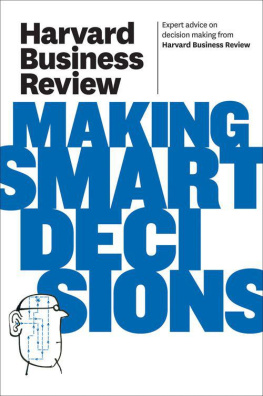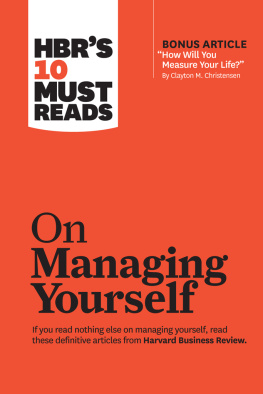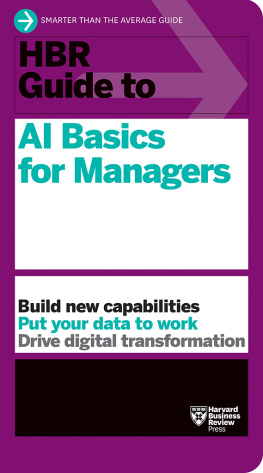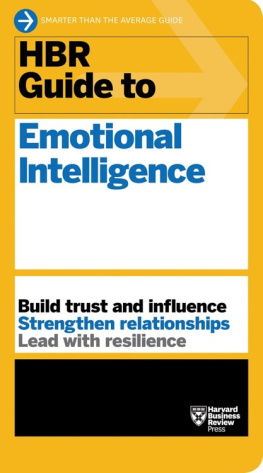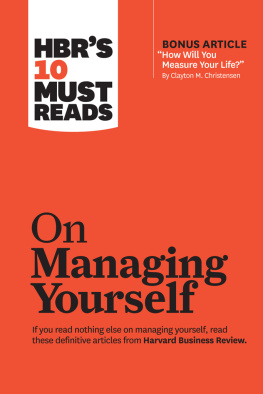Contents
Guide
Pagebreaks of the print version
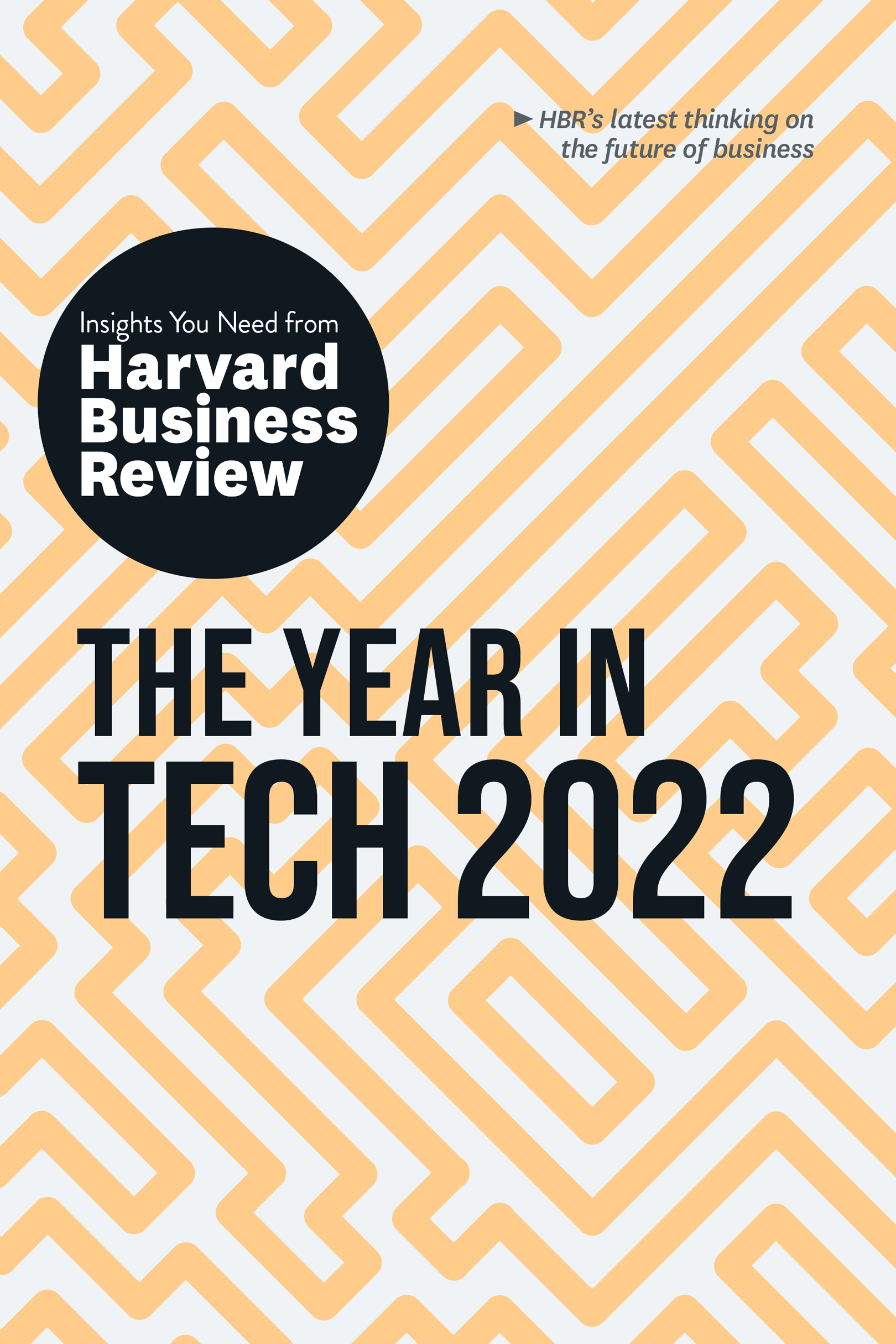
Insights You Need from Harvard Business Review
Business is changing. Will you adapt or be left behind?
Get up to speed and deepen your understanding of the topics that are shaping your companys future with the Insights You Need from Harvard Business Review series. Featuring HBRs smartest thinking on fast-moving issuesblockchain, cybersecurity, AI, and moreeach book provides the foundational introduction and practical case studies your organization needs to compete today and collects the best research, interviews, and analysis to get it ready for tomorrow.
You cant afford to ignore how these issues will transform the landscape of business and society. The Insights You Need series will help you grasp these critical ideasand prepare you and your company for the future.
Books in the series include:
Agile
Artificial Intelligence
Blockchain
Climate Change
Coronavirus: Leadership and Recovery
Customer Data and Privacy
Cybersecurity
Global Recession
Monopolies and Tech Giants
Racial Justice
Strategic Analytics
The Year in Tech 2021
The Year in Tech 2022

THE YEAR IN TECH 2022
Harvard Business Review Press
Boston, Massachusetts
HBR Press Quantity Sales Discounts
Harvard Business Review Press titles are available at significant quantity discounts when purchased in bulk for client gifts, sales promotions, and premiums. Special editions, including books with corporate logos, customized covers, and letters from the company or CEO printed in the front matter, as well as excerpts of existing books, can also be created in large quantities for special needs.
For details and discount information for both print and
ebook formats, contact ,
tel. 800-988-0886, or www.hbr.org/bulksales.
Copyright 2021 Harvard Business School Publishing Corporation
All rights reserved
No part of this publication may be reproduced, stored in or introduced into a retrieval system, or transmitted, in any form, or by any means (electronic, mechanical, photocopying, recording, or otherwise), without the prior permission of the publisher. Requests for permission should be directed to , or mailed to Permissions, Harvard Business School Publishing, 60 Harvard Way, Boston, Massachusetts 02163.
The web addresses referenced in this book were live and correct at the time of the books publication but may be subject to change.
Library of Congress Cataloging-in-Publication Data
Names: Harvard Business Review Press.
Title: The year in tech, 2022 : the insights you need from Harvard Business Review.
Other titles: Insights you need from Harvard Business Review.
Description: Boston, Massachusetts : Harvard Business Review Press, [2022] | Series: Insights you need from Harvard Business Review | Includes index.
Identifiers: LCCN 2021022444 | ISBN 9781647821753 (paperback) | ISBN 9781647821760 (ebook)
Subjects: LCSH: BusinessTechnological innovations. | Industrial management. | Success in business.
Classification: LCC HD45 .Y68 2022 | DDC 658.5/14dc23
LC record available at https://lccn.loc.gov/2021022444
ISBN: 978-1-64782-175-3
eISBN: 978-1-64782-176-0
Contents
- Disruptions are coming faster than expected
- by Larry Downes
- AI doesnt just scale solutionsit also scales risk.
- by Reid Blackman
- VR enables immersive, interactive learning experiences.
- by Jeanne C. Meister
- Prescribable applications could transform health care.
- by Ariel D. Stern, Henrik Matthies, Julia Hagen, Jan B. Brnneke, and Jrg F. Debatin
- Blockchain can enhance trust, efficiency, and speed.
- by Vishal Gaur and Abhinav Gaiha
- Imagine preparing your next presentation using only your thoughts.
- by Alexandre Gonfalonieri
- Unhackable encryption could be on the horizon.
- by Shohini Ghose
- Private space travel is just the beginning.
- by Matt Weinzierl and Mehak Sarang
- The era of the tech titans may be nearing an end.
- by Malle Gavet
- Youre constantly wondering, How long can I last?
- by LeRon L. Barton
- Lessons from industries that have done so successfully.
- by Michael A. Cusumano, Annabelle Gawer, and David B. Yoffie
- Beware digital technologies that worsen environmental problems.
- by Sanjay Podder, Adam Burden, Shalabh Kumar Singh, and Regina Maruca
Introduction
BUSINESS REALITY IS RAPIDLY CLOSING IN ON SCIENCE FICTION
by Larry Downes
As organizations worldwide shake off the impact of compound crises, new and emerging technologies shine brightly as a rare source of optimism, with the potential to jump-start renewed growth and even improve the human condition. This book explores a remarkable range of new and future business innovations, using technologies as varied as artificial intelligence, virtual reality, brain-computer interfaces, and quantum computing. One piece even proclaims the dawn of the commercial space age.
Whats most striking about these visions is how todays business reality is closing in on what was once futuristic science fiction. As HR consultant Jeanne C. Meister points out, virtual reality technologya distant dream only a few years agois already being employed to resolve a soft skills crisis. Businesses are now using VR to help their people develop their abilities in customer service, presentations, and employee evaluations. Another piece shows how digital health care, including the telehealth and remote diagnostic approaches that became familiar during the Covid-19 pandemic, can be more effective and equitable than yesterdays broken system. And a third examines how blockchain technology is being deployed to improve the safety and efficiency of disparate supply chains for a variety of critical manufacturing applications.
Many of these advances will inevitably come as shocks to existing industries. They will arrive sooner than expected and change business practices in unpredictable ways. Many will come from surprising sources, including new entrants to mature markets. As author David Weinberger pointed out in last years edition of The Year in Tech, the internet has disrupted not only our old ways of doing things, but even our idea of how progress works.
Disruption remains the operative word this year. Indeed, some of the applications described in these pages will likely turn out to be what Paul Nunes and I have termed Big Bang Disruptionsinnovations built on technologies that are both better and cheaper than existing offerings. That powerful one-two punch guarantees rapid and chaotic reconfigurations of industries, some of which may not have experienced significant change in several generations of managers.
The chaos of Big Bang Disruption challenges the management abilities and institutional resilience of all business as they struggle for pole position in the emerging ecosystems that new technologies create. Yet, at the same time, these disruptions often produce better quality and better prices for consumers.
This paradox is not new. Whether the most disruptive technologies are viewed as helpful or harmful frequently depends on who is using them. Indeed, as even the occasional consumer of science fiction knows, visions of the future often neatly divide themselves between utopia and dystopia. The


